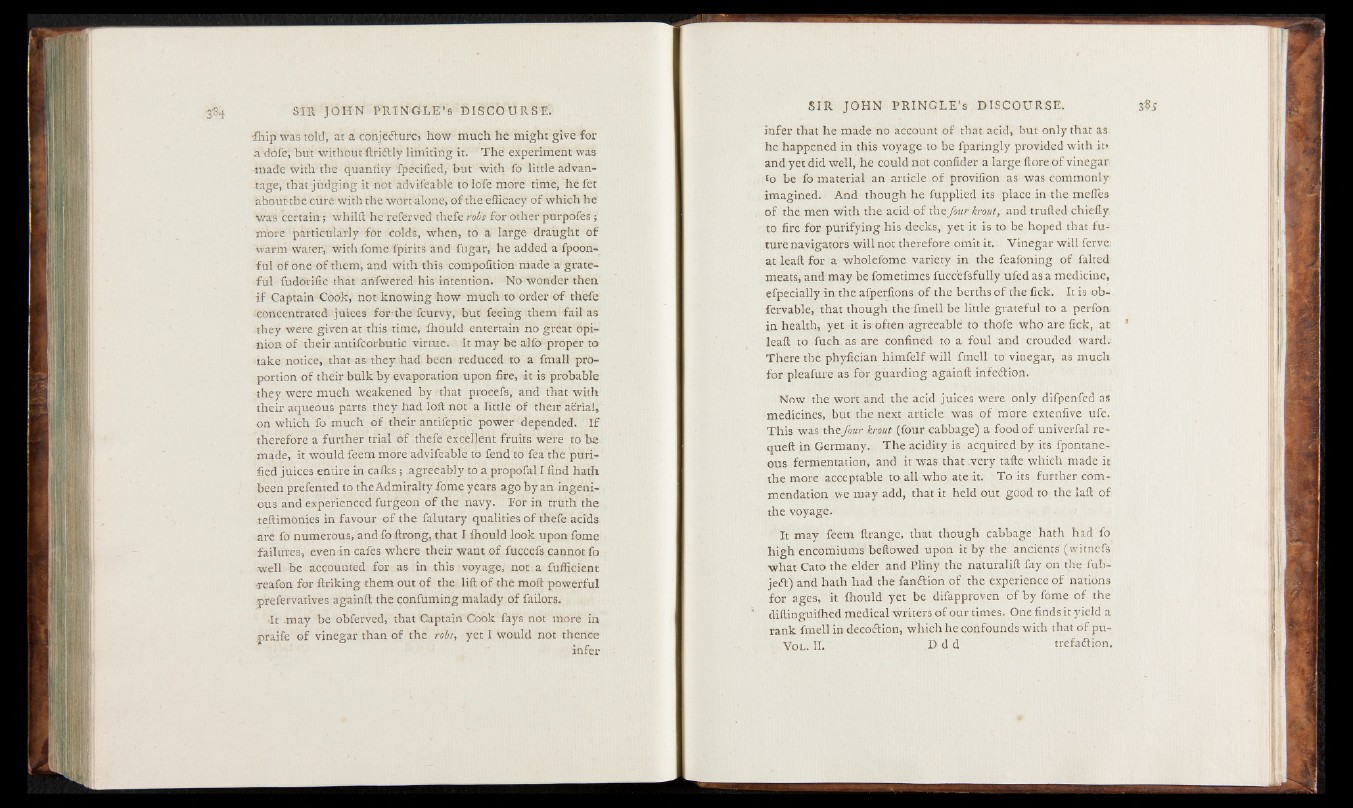
fhip was told, at a conjecture) how much he might give for
a dofe, but without ftridtly limiting it. The experiment was
•made with the quantity fpecified, but with fo little advantage,
that judging it not advifeable to lofe more time, he fet
ahout'the cure with the wort alone, of the efficacy o f which he
was certain; whilft he referved thefe robs for other purpofes ;
more particularly for colds, when, to a large draught of
warm water, with fome fpirits and fugar, he added a fpoon-
ful of one of them, and with this compofition made a grateful
fudorific that anfwered his intention. No wonder then
i f Captain Cook, not knowing how much to order of thefe
concentrated juices for the fcurvy, but feeing them fail as
they were given at this time, fhould entertain no great opinion
of their antifcorbutic virtue. It may be alfo proper to
take notice, that as they had been reduced to a fmall proportion
of their bulk by evaporation upon fire, it is probable
they were much weakened by • that procefs, and that with
their aqueous parts they had loft not a little of their aerial,
on which fo much of their.antifeptic power depended. If
therefore a further trial of thefe excellent fruits were to be.
made, it would feem more advifeable to fend to fea the purified
juices entire in cafks ; .agreeably to a propofall find hath
been prefented to the Admiralty fome years ago by an ingenious
and experienced furgeon of the navy. For in truth the
teftimohies in favour of the falutary qualities of thefe acids
are fo numerous, and fo ftrong, that I fhould look upon fome
failures, even in cafes where their want of fuccefs cannot fo
well be accounted for as in this voyage, not a fufficient
reafon for ftriking them out of the lift of the moft powerful
•prefervatives againft the confuming malady of failors.
It may be obferved, that Captain Cook fays not more in
praife of vinegar than of the robs, yet I would not thence
infer
infer that he made no account of that acid, but only that as
he happened in this voyage to be fparingly provided with it»
and yet did well, he could not confider a large ftore of vinegar
to be fo material an article of provifion as was commonly
imagined. And though he fupplied its place in the mefles
of the men with the acid of the four krout, and trailed chiefly
to fire for purifying his decks, yet it is to be hoped that future
navigators will not therefore omit it. Vinegar w ill ferve,
at leaft for a wholefome variety in the feafoning of falted
meats, and may be fometimes fuccfefsfully ufed as a medicine,
efpecially in the afperfions of the berths of the lick. It is ob-
fervable, that though the fmell be little grateful to a perfon
in health, yet it is often agreeable to thofe who are lick, at '
leaft to fuch as are confined to a foul and crouded ward.
There the phyfician himfelf will fmell to vinegar, as much
for pleafure as for guarding againft infedtion.
Now the wort and the acid juices were only difpenfed as
medicines, but the next article was of more extenfive ufe.
This was the four krout (four cabbage) a food of univerfal re-
queft in Germany. The acidity is acquired by its fpontane-
ous fermentation, and it was that .very tafte which made it
the more acceptable to all who ate it. To its further commendation
we may add, that it held out good to the laft of
the voyage.
It may feem ftrange, that though cabbage hath had fo
high encomiums bellowed upon it by the ancients (witnefs
what Cato the elder and Pliny the naturalift fay on the fub-
jedl) and hath had the fandlion of the experience of nations
for ages, it fhould yet be difapproven of by fome of the
diftinguiffied medical writers of our times. One finds it yield a
rank fmell in decodtion, which he confounds with that of pu-
Vol. II. D d d trefadlion.